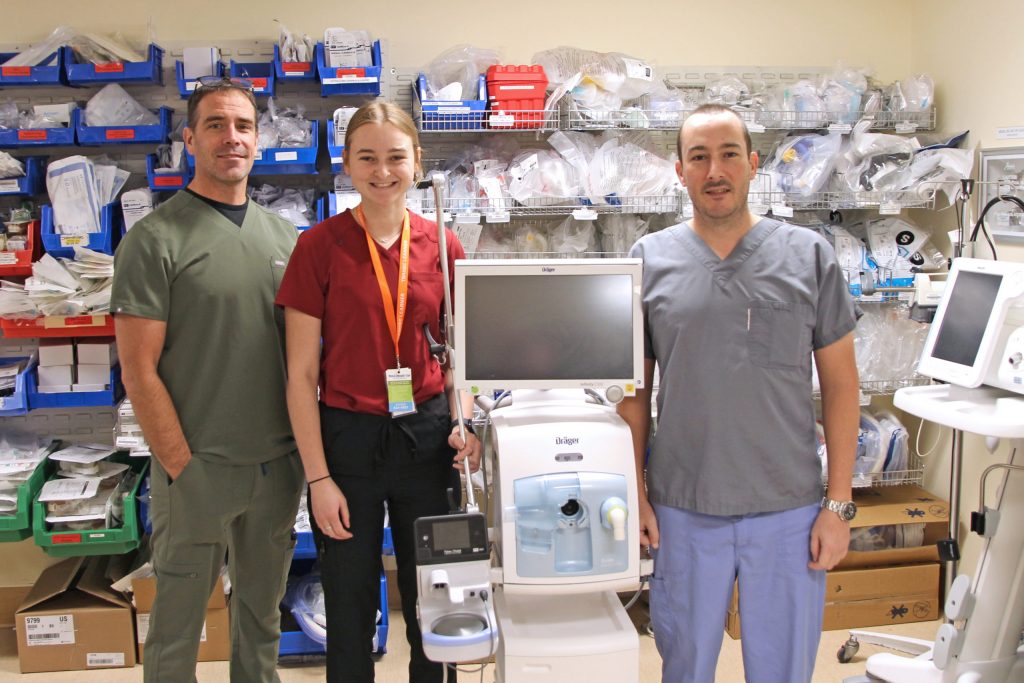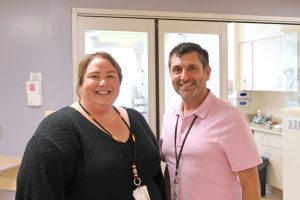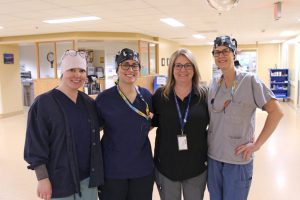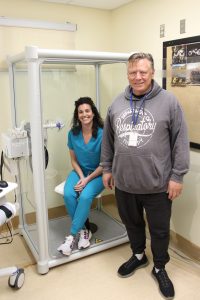Celebrating Respiratory Therapy Week (October 20-26)
by Raiili Pellizzari
 (From L-R): Jason Walt, RRT; Heidi Neuman (RT student), and Drew Edgar, RRT.
(From L-R): Jason Walt, RRT; Heidi Neuman (RT student), and Drew Edgar, RRT.Thunder Bay Regional Health Sciences Centre is joining others across the country by celebrating Respiratory Therapy Week from October 20-26.
Respiratory therapists (RTs) are highly-skilled health care professionals. They have specialized medical expertise and use their knowledge and skills to provide safe, high-quality care. If you have medical problems that may be caused by cardiorespiratory or respiratory-related issues, RTs are the experts who will work with you to diagnose, treat and manage your condition.
Within our Hospital there are always RTs working hard 24 hours a day, 7 days a week, across all patient populations. RTs are a vital part of the front-line care team in many areas including the intensive care unit, the emergency department, operating rooms, NICU, outpatient clinics and home care. RTs perform a variety of vital roles throughout our Hospital. They are called for all high-risk deliveries including C-sections, traumas, conscious sedations, cardioversions, puffer administration and education, arterial blood gases, insertion of arterial catheters, non-invasive mechanical ventilation, (like CPAPs or BiPAPs), high flow oxygen therapy, and so much more.
Leadership Roles for RTs

(From L-R): Jennifer Gadioma, Interprofessional Educator; Bruno Tassone, Critical Care and Respiratory Services Coordinator (not pictured – Darolyn Hryciw, RRT Charge).
Respiratory therapists use their skills and knowledge to take on various leadership roles throughout our Hospital. Darolyn Hryciw is the RRT Charge and her role consists of managing day-to-day operations, scheduling, and equipment and supplies management. Bruno Tassone is the Critical Care and Respiratory Services Coordinator. He is responsible for the day-to-day operations of the Regional Critical Care Response (RCCR) as well as the Medical Emergency Team. Jennifer Gadioma is an Interprofessional Educator. Within her role, she helps advance the practice of health care professionals’ organization wide by providing hospital-wide education. Shawn Jacobson is the Education Lead and he organizes all the education and clinical placements for the Respiratory Therapy students from Canadore College. Aaron Giba is the Professional Practice Lead for the Respiratory Department, and provides leadership and guidance in everyday practice as well as policy development and implementation.
Operating Room

(From L-R): Brittney Goral, RRT; Samantha Nigro, RRT and AA; Darolyn Hryciw, RRT, AA and Charge RRT; Leanna Black, RRT and AA.
The anesthesia assistant (AA) is an essential member of the Operating Room (OR) team. AAs are respiratory therapists who have an additional 18 months of training in advanced anesthesia skills in order to facilitate the administration of anesthetic services, both in an out of the OR. Within the OR, they assist with the setup and induction of anesthesia for more complex surgical cases. Their duties include advanced airway management, line insertion as well as assistance with epidural/spinal blocks, peripheral nerve blocks and difficult intubation protocols. AAs can prepare and administer a variety of anesthetic agents and manage stable patients under anesthesia while the anesthetist performs other duties within the OR. They also maintain and troubleshoot all anesthesia equipment and are often called upon to assist with anesthetic emergencies. They prepare the OR for malignant hyperthermia cases and are well-versed in the management of this rare but life-threatening emergency. Outside of the OR, AAs set up and assist with sedation cases in diagnostic imaging that require advanced monitoring and generally facilitate any off-service anesthetic duty. The introduction of AAs have allowed anesthesia services to expand at a time when anesthesia resources are very limited.
Outpatient Clinics, Stress lab, Pulmonary Function Testing Lab

(From L-R): Loriana Manion, RRT – Stress Lab and Dennis Poulin, RRT – PFT lab.
Respiratory therapists also provide care in outpatient clinics and our diagnostic area. They conduct tests to measure lung function and teaching people to manage asthma, chronic obstructive pulmonary disorder among other cardiac and lung functions.